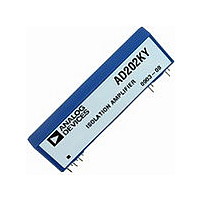AD204JN Analog Devices Inc, AD204JN Datasheet - Page 10

AD204JN
Manufacturer Part Number
AD204JN
Description
IC, ISOLATION AMPLIFIER, 5KHZ, DIP-10
Manufacturer
Analog Devices Inc
Type
Isolation Amplifierr
Datasheet
1.AD202JN.pdf
(12 pages)
Specifications of AD204JN
No. Of Amplifiers
1
Isolation Voltage
750Vrms
Gain Non-linearity Max
0.05%
Amplifier Case Style
DIP
No. Of Pins
10
Input Offset Voltage
15mV
Bandwidth
5kHz
Rohs Status
RoHS non-compliant
Amplifier Type
Isolation
Number Of Circuits
4
Gain Bandwidth Product
5kHz
Current - Input Bias
30pA
Voltage - Input Offset
15000µV
Current - Output / Channel
2mA
Operating Temperature
0°C ~ 70°C
Mounting Type
Through Hole
Package / Case
38-DIP (0.500", 12.70mm), 11 Leads
Number Of Channels
1
Number Of Elements
1
Common Mode Rejection Ratio
130dB
Voltage Gain Db
40dB
Input Resistance
2000MOhm
Input Bias Current
30pA
Rail/rail I/o Type
No
Operating Temp Range
-40C to 85C
Operating Temperature Classification
Industrial
Mounting
Through Hole
Pin Count
11
Package Type
PDIP
Lead Free Status / RoHS Status
Contains lead / RoHS non-compliant
Current - Supply
-
Output Type
-
Voltage - Supply, Single/dual (±)
-
-3db Bandwidth
-
Slew Rate
-
Lead Free Status / Rohs Status
Not Compliant
AD202/AD204
High Compliance Current Source. In Figure 19, an isolator
is used to sense the voltage across current-sensing resistor R
allow direct feedback control of a high voltage transistor or FET
used as a high compliance current source. Since the isolator has
virtually no response to dc common-mode voltage, the closed-
loop current source has a static output resistance greater than
10
current capability of the circuit is limited only by power dissipa-
tion in the source transistor.
Motor Control Isolator. The AD202 and AD204 perform
very well in applications where rejection of fast common-mode
steps is important but bandwidth must not be compromised.
Current sensing in a fill-wave bridge motor driver (Figure 20) is
one example of this class of application. For 200 V common-mode
steps (1 ms rise time) and a gain of 50 as shown, the typical
response at the isolator output will be spikes of ± 5 mV ampli-
tude, decaying to zero in less than 100 ms. Spike height can be
reduced by a factor of four with output filtering just beyond the
isolator’s bandwidth.
14
W even for output currents of several mA. The output
200V dc
I
L
Figure 19. High Compliance Current Source
+
–
=
Figure 20. Motor Control Current Sensing
–10V TO +250V
V
R
C
MPS
S
U10
R
1k
LOAD
S
5m
100mV
1k
10k
+
–
AD204
470pF
20A
+15V
–15V
AD202
AD204
OR
M
100k
+5V REF
V
5V
C
+
–
20k
S
to
–10–
(NOTE: Circuit figures shown on this page are for SIP-style packages. Refer to
Page 3 for proper DIP package pinout.)
Floating Current Source/Ohmmeter. When a small floating
current is needed with a compliance range of up to ± 1000 V dc,
the AD204 can be used to both create and regulate the current.
This can save considerable power, since the controlled current
does not have to return to ground. In Figure 21, an AD589
reference is used to force a small fixed voltage across R. That
sets the current that the input op amp will have to return
through the load to zero its input. Note that the isolator’s out-
put isn’t needed at all in this application; the whole job is done
by the input section. However, the signal at the output could be
useful as it’s the voltage across the load, referenced to ground.
Since the load current is known, the output voltage is propor-
tional to load resistance.
Photodiode Amplifier. Figure 22 shows a transresistance
connection used to isolate and amplify the output of a photo-
diode. The photodiode operates at zero bias, and its output
current is scaled by R
AD589
I
V
30k
LOAD
LOAD
PHOTO
10 A
DIODE
=
FS
1.23V
4V
Figure 21. Floating Current Source
R
Figure 22. Photodiode Amplifier
+
1 F
500k
(2mA MAX)
LOAD
F
to give a 5 V full-scale output.
R
7.5V
AD202
AD204
OR
AD204
0V TO 5V
V
O
=
V
R
+
–
R
REV. D
R
L












